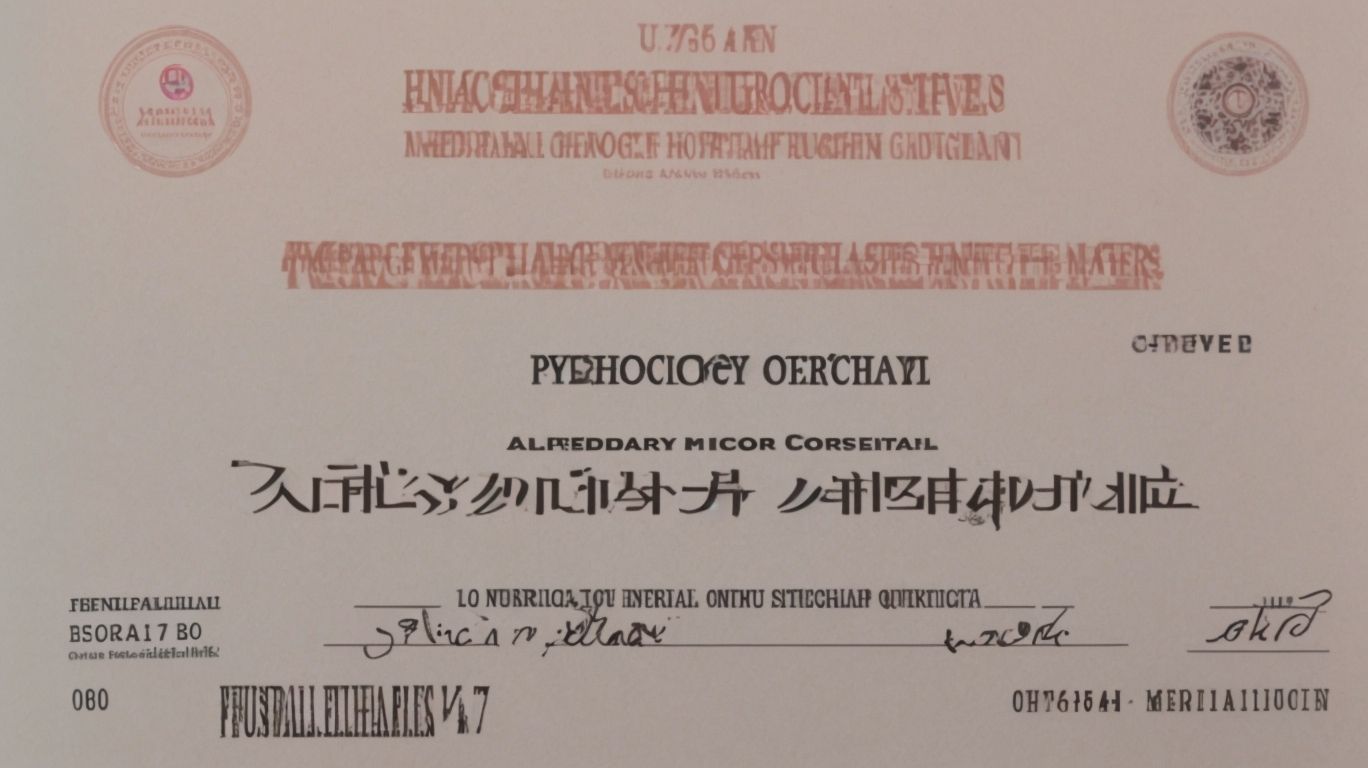Are you interested in a career in psychology? If so, you may have heard about the importance of obtaining a psychology license. In this article, we will explore the ins and outs of what a psychology license is, why it is necessary, and the key points and requirements for obtaining one.
We will also discuss the different types of psychology licenses available and how you can go about obtaining one. Whether you’re just starting your journey in psychology or are considering pursuing a license, this article will provide valuable insights into the benefits and limitations of holding a psychology license.
Contents
- 1 Key Takeaways:
- 2 What Is a Psychology License?
- 3 Why is a Psychology License Necessary?
- 4 What Are the Key Points of a Psychology License?
- 5 What Are the Different Types of Psychology Licenses?
- 6 How Do You Obtain a Psychology License?
- 7 What Are the Benefits of Having a Psychology License?
- 8 What Are the Limitations of a Psychology License?
- 9 Frequently Asked Questions
- 9.1 What is a psychology license and why is it important to understand?
- 9.2 What are the key points to know about obtaining a psychology license?
- 9.3 Do all states have the same requirements for a psychology license?
- 9.4 What are the benefits of holding a psychology license?
- 9.5 What happens if a licensed psychologist violates their license?
- 9.6 Are there different types of psychology licenses?
Key Takeaways:
- A psychology license is required to legally practice psychology and protects the public from unqualified practitioners.
- Key requirements for a psychology license include education, supervised experience, examination, and continuing education.
- Types of psychology licenses include clinical, counseling, school, and forensic, each with their own specific requirements and focus areas.
What Is a Psychology License?
A psychology license grants individuals, such as psychologists, the legal authorization to practice within a specific jurisdiction, signifying that they have met the regulatory requirements and standards for professional competency, ethical conduct, and continuing education.
Obtaining a psychology license is a crucial step in establishing professional credibility and demonstrating a commitment to upholding the well-being and confidentiality of clients. It signifies that the psychologist has undergone rigorous training and assessment to ensure they are equipped to provide high-quality care and are bound by ethical guidelines.
A psychology license holds significant legal weight, ensuring that practitioners are in compliance with regulations governing the practice of psychology. This is essential in protecting the public from unqualified or unethical practitioners, ultimately safeguarding the integrity of the profession.
- The process of obtaining a psychology license involves completing specific educational requirements, accruing supervised clinical hours, and passing a licensure examination.
- The ongoing maintenance of licensure typically requires professionals to engage in continuing education and adhere to ethical standards, reinforcing their dedication to professional development and ethical conduct.
Why is a Psychology License Necessary?
A psychology license is necessary to ensure that practitioners, including psychologists, adhere to the established laws, regulations, and ethical guidelines governing their professional practice, promoting the delivery of competent, safe, and ethical services to clients and the public.
By obtaining a psychology license, practitioners demonstrate their commitment to upholding legal and ethical standards set forth by regulatory bodies and professional organizations. This licensing process involves rigorous education, training, and examination to assess competence and readiness to provide psychological services.
It serves to promote professional accountability by holding practitioners responsible for their actions, ensuring that they abide by the standards of conduct and practice. The license serves as a safeguard, protecting the welfare of clients by requiring practitioners to adhere to best practices and ethical guidelines, thereby minimizing the risk of harm or misconduct.
What Are the Key Points of a Psychology License?
The key points of a psychology license encompass stringent education requirements, supervised practice, and the successful completion of professional examinations that are mandated and overseen by the relevant regulatory body, such as the California Board of Psychology.
Education forms the foundation of obtaining a psychology license. Typically, candidates are required to complete a doctoral degree in psychology from an accredited institution, which includes coursework in various areas such as clinical, counseling, or school psychology.
Supervised practice is a pivotal aspect, often involving thousands of hours under the guidance of experienced professionals to ensure mastery of clinical skills and ethical conduct.
Professional examinations, like the Examination for Professional Practice in Psychology (EPPP), represent a significant hurdle, covering core psychology topics. These examinations are crucial for assessing the competence of aspiring practitioners.
Throughout this process, regulatory bodies, such as the California Board of Psychology, monitor and evaluate the qualifications and abilities of candidates, ensuring compliance with the highest standards of professional practice.
Education Requirements
The education requirements for a psychology license typically entail the completion of a doctoral degree in psychology from an accredited institution, meeting the standards outlined by organizations such as the American Psychological Association and the Association of State and Provincial Psychology Boards (ASPPB).
Graduating from a doctoral program in psychology demonstrates a deep understanding of the field’s complexities, providing the necessary knowledge and skills essential for professional practice.
Accreditation by reputable organizations ensures that the curriculum meets established standards, fostering comprehensive learning and ethical conduct. This advanced level of education is crucial for aspiring psychologists to develop expertise in specialized areas, such as clinical, counseling, or research psychology.
Aligning with professional organizations such as the American Psychological Association (APA) and the Association of State and Provincial Psychology Boards (ASPPB) allows individuals to stay updated with the latest regulations, ethical guidelines, and best practices in the field.
These affiliations also provide opportunities for networking, mentorship, and continuing education, contributing to the ongoing professional development of licensed psychologists.
Supervised Experience
Supervised experience forms a crucial component of the licensure process for psychologists, ensuring that candidates acquire the necessary professional skills, competencies, and ethical foundations under the guidance of experienced practitioners, in alignment with the requirements set forth by licensing boards.
This practical experience provides aspiring psychologists with invaluable opportunities to apply theoretical knowledge in real-world scenarios, honing their clinical judgment and intervention techniques.
The mentorship offered during supervised practice fosters a supportive environment where candidates can seek guidance, ask questions, and address professional challenges, accelerating their growth and development.
This process facilitates a smooth transition from academic learning to independent professional practice, equipping psychologists with critical practical competencies necessary for the diverse, complex demands of their future roles.
Examination
The examination phase of the licensure process involves the successful completion of standardized assessments such as the Examination for Professional Practice in Psychology (EPPP) and state-specific examinations, evaluating candidates’ knowledge of psychological principles, ethics, and compliance with local laws and regulations.
Candidates may be required to demonstrate their understanding of specific state regulations and laws pertinent to professional practice, as well as their adherence to ethical guidelines set forth by the American Psychological Association (APA) and other relevant professional bodies.
This may encompass an evaluation of candidates’ capacity to apply ethical decision-making frameworks to hypothetical scenarios, showcasing their grasp of ethical principles in practice.
Practical experience and supervised clinical hours are often integral components of the licensure process, serving as a means to evaluate candidates’ application of theoretical knowledge in real-world settings.
This ensures that candidates possess the necessary clinical skills, judgment, and professional conduct to safeguard the well-being of their clients.
Continuing Education
Continuing education serves as a vital component of maintaining a psychology license, requiring practitioners to regularly engage in professional development activities, such as workshops, seminars, and coursework, to enhance their knowledge, skills, and ethical competence in alignment with the evolving standards of practice.
Along with broadening their clinical expertise, ongoing professional development also enables psychologists to stay abreast of the latest research findings, evidence-based interventions, and ethical considerations pertinent to their field.
Engaging in continuing education not only fosters professional growth but also ensures compliance with licensure requirements, thereby upholding the highest standards of care and ethical conduct.
What Are the Different Types of Psychology Licenses?
Psychology licenses encompass various specializations, including clinical psychology, counseling psychology, and other specialized fields, each tailored to meet the distinct legal and professional practice requirements governing their respective domains of expertise.
Clinical psychology licenses typically demand extensive supervised clinical experience, often involving internships or practical training. The professionals in this field focus on diagnosing and treating mental, emotional, and behavioral disorders.
Meanwhile, counseling psychology licenses emphasize the application of psychological principles to help individuals improve their well-being, develop coping strategies, and understand and cope with life challenges.
fields such as forensic psychology or industrial-organizational psychology require specific expertise and may involve assessments, research, and intervention in unique settings.
Clinical Psychologist
A clinical psychologist license entails specialized training, professional experience, and adherence to the rigorous standards mandated by entities like the American Board of Professional Psychology (ABPP), allowing practitioners to diagnose, treat, and provide therapeutic interventions for individuals with various mental health and psychological concerns.
Obtaining a clinical psychologist license typically requires a doctoral degree in psychology, extensive supervised clinical experience, and successful completion of state licensing exams.
Once licensed, clinical psychologists must adhere to ethical guidelines and ongoing professional development, often through continued education and supervised practice.
Practitioners may pursue board certification through organizations like ABPP to demonstrate advanced skills and a commitment to maintaining high standards of practice.
Licensed clinical psychologists are committed to promoting mental wellness and providing evidence-based interventions to improve the lives of their clients.
Counseling Psychologist
A counseling psychologist license encompasses the authorization to engage in the provision of counseling services, psychotherapy, and mental health interventions within the scope of ethical and professional guidelines, following the completion of relevant educational and training requirements.
Aspiring counseling psychologists must complete a doctoral degree in psychology from an accredited institution, with a focus on counseling psychology. This is typically followed by supervised clinical experience and internship, totaling around 3,000 hours.
To obtain licensure, a state-administered examination, such as the Examination for Professional Practice in Psychology (EPPP), is commonly required to demonstrate competency and adherence to professional standards.
School Psychologist
A school psychologist license facilitates the practice of psychological assessment, consultation, and intervention services in educational settings, aligning with the educational and accreditation standards established by bodies such as the Masters in Psychology and Counseling Accreditation Council (MPCAC).
School psychologists with a valid license are equipped with the specialized training and expertise necessary to address diverse student needs.
They play a pivotal role in promoting mental health and well-being within school communities by conducting comprehensive assessments and delivering evidence-based interventions.
Possessing a school psychologist license signifies compliance with ethical guidelines and professional standards, ensuring the provision of high-quality psychological services to students, families, and educators.
It also enables practitioners to collaborate effectively with multidisciplinary teams and contribute to the development and implementation of Individualized Education Programs (IEPs) for students with exceptionalities.
Forensic Psychologist
A forensic psychologist license authorizes professionals to apply psychological principles and expertise within legal and judicial contexts, aligning with the guidelines and standards set forth by the Association of State and Provincial Psychology Boards (ASPPB) and other relevant regulatory entities.
The licensing process for forensic psychologists includes meeting educational requirements, such as obtaining a doctoral degree in psychology from an accredited institution. Additionally, specialized training and supervised experience in forensic psychology are necessary.
Applicants must also pass the Examination for Professional Practice in Psychology (EPPP) and adhere to the American Psychological Association’s (APA) Code of Ethics to demonstrate a commitment to ethical practice. Ongoing competence and professional development may also be required through continuing education requirements.
How Do You Obtain a Psychology License?
Obtaining a psychology license involves a comprehensive process comprising the fulfillment of education requirements, gaining supervised experience, passing the requisite examinations, and adhering to ongoing continuing education mandates, all overseen by the relevant licensing authority and regulatory entities.
The first step in obtaining a psychology license is completing a doctoral degree in psychology from an accredited program by the American Psychological Association (APA) or National Association of School Psychologists (NASP).
Following this, aspiring psychologists must undergo supervised clinical experience, working under experienced licensed professionals for hands-on training.
Once these requirements are met, individuals must pass the Examination for Professional Practice in Psychology (EPPP) administered by the Association of State and Provincial Psychology Boards (ASPPB).
After obtaining a license, psychologists must continue their professional development and adhere to ethical guidelines and laws set by their licensing authority.
Complete Education Requirements
The initial phase of obtaining a psychology license involves the completion of an accredited doctoral degree in psychology, followed by the acquisition of relevant professional experience and the development of ethical competence in alignment with the standards of practice.
Attainment of a doctoral degree in psychology is a foundational requirement for licensure. This involves comprehensive study in areas such as psychological assessment, counseling techniques, research methodologies, and ethical principles.
After completing academic requirements, practical experience through supervised internships or postdoctoral work becomes essential. This allows individuals to apply theoretical knowledge within real-world contexts, honing clinical skills and gaining exposure to diverse patient populations.
Ethical development is a critical facet, requiring adherence to professional codes of conduct, confidentiality regulations, and ethical decision-making in accordance with the American Psychological Association (APA) guidelines.
Gain Supervised Experience
Securing supervised experience forms a pivotal phase in the licensure process, enabling candidates to refine their clinical skills, expand their professional competencies, and foster ethical decision-making under the mentorship of experienced practitioners.
This structured practice provides a platform for aspiring professionals to apply theoretical knowledge to real-world scenarios, bridging the gap between academic learning and practical application.
Supervised experience equips individuals with the confidence to handle complex cases, sharpens their critical thinking abilities, and nurtures adaptability in diverse clinical settings.
The guidance from seasoned mentors not only enhances technical proficiency but also instills a deep understanding of ethical and legal frameworks, nurturing a sense of responsibility and accountability.
This apprenticeship-style approach not only hones technical skills but also fosters a deep sense of professional ethics and best practices, preparing individuals to navigate the complexities of the practical world of licensure.
Pass the Examination
The examination phase of the licensure process involves the successful completion of standardized assessments such as the Examination for Professional Practice in Psychology (EPPP) and state-specific examinations, evaluating candidates’ knowledge of psychological principles, ethics, and compliance with local laws and regulations.
Candidates may be required to undergo a thorough evaluation of their academic and practical qualifications, along with assessments of their adherence to professional standards and ethical conduct.
These evaluations often encompass a review of the candidates’ educational background, supervised experience, and continuing education credits.
A comprehensive examination of candidates’ clinical proficiency and competence in areas such as assessment, intervention, and consultation is also a crucial component.
The licensure process may involve an assessment of candidates’ understanding of professional ethics, legal standards related to the practice of psychology, and their ability to apply psychological principles and theories to real-world scenarios.
Fulfill Continuing Education Requirements
Continuing education serves as a vital component of maintaining a psychology license, requiring practitioners to regularly engage in professional development activities, such as workshops, seminars, and coursework, to enhance their knowledge, skills, and ethical competence in alignment with the evolving standards of practice.
Participating in ongoing education not only allows psychologists to stay abreast of the latest research and therapeutic techniques but also helps them meet the licensure requirements set by regulatory bodies.
By staying informed about new methodologies and ethical considerations, professionals can provide the highest quality of care to their clients while demonstrating a commitment to lifelong learning.
Additionally, compliance with continuing education mandates ensures that psychologists remain current and competent in their field, upholding professional standards and fostering public trust.
What Are the Benefits of Having a Psychology License?
Acquiring a psychology license confers numerous benefits, including the authorization to engage in professional practice, eligibility for employment in various settings, and the ability to formalize specialized expertise and competencies within the field of psychology.
One of the primary advantages of holding a psychology license is the authorization it grants individuals to practice as licensed psychologists.
This licensure allows professionals to independently assess, diagnose, and treat mental health disorders, thereby contributing significantly to the well-being of their clients.
Possessing a psychology license opens up diverse career prospects, including opportunities to work in clinical, educational, research, and organizational settings.
This facilitates professionals in pursuing their passion and gaining substantial experience in a variety of specialized fields within psychology.
Obtaining a psychology license symbolizes formal recognition of an individual’s specialized expertise, bolstering their credibility and professional standing.
This official recognition signifies the culmination of rigorous training, education, and demonstrated competence, thereby enhancing the trust and confidence of clients, employers, and colleagues in the professional capabilities of the licensed individual.
What Are the Limitations of a Psychology License?
While a psychology license give the power tos practitioners with legal authority and professional recognition, it also imposes certain limitations, such as the adherence to regulatory standards, ongoing professional responsibilities, and potential constraints on practice scope and settings.
Psychologists holding a license must strictly comply with the ethical and legal guidelines established by their respective licensing board. This ensures that their conduct and practice mechanisms align with the prescribed professional standards.
The license also requires practitioners to engage in continuous professional development activities, such as continuing education and supervised practice. This helps them stay updated with the latest research findings, therapeutic techniques, and advancements in psychological assessment and intervention strategies.
However, the scope of practice under a psychology license may be subject to geographic restrictions, practice settings limitations, or specific client populations. This can impact the diversity and breadth of services that can be offered in certain jurisdictions or specialized areas of psychology.
Frequently Asked Questions
What is a psychology license and why is it important to understand?
A psychology license is a legal document that grants an individual the authority to practice psychology in a specific jurisdiction. It is important to understand because it ensures that practitioners have met the necessary qualifications and standards to provide ethical and competent services to the public.
What are the key points to know about obtaining a psychology license?
The key points to know about obtaining a psychology license are: completing a doctoral degree in psychology, completing supervised clinical experience, passing a licensing exam, and meeting any additional requirements such as continuing education or background checks.
Do all states have the same requirements for a psychology license?
No, each state has its own specific requirements for obtaining a psychology license. It is important to research the licensing board of the state you wish to practice in to ensure you meet all the necessary qualifications.
What are the benefits of holding a psychology license?
Holding a psychology license allows an individual to legally practice and provide services within their scope of practice. It also provides credibility and increased job opportunities, as many organizations and insurance companies require licensed practitioners.
What happens if a licensed psychologist violates their license?
If a licensed psychologist violates their license, they may face disciplinary action from the licensing board. This can range from a warning or fine to suspension or revocation of their license. It is important for licensed psychologists to adhere to ethical and legal standards to maintain their license.
Are there different types of psychology licenses?
Yes, there are different types of psychology licenses that vary by state and can include: Licensed Psychologist (LP), Licensed Clinical Psychologist (LCP), Licensed Mental Health Counselor (LMHC), and Licensed Professional Counselor (LPC). Each type may have different requirements and restrictions, so it is important to understand the specific license you are seeking.





